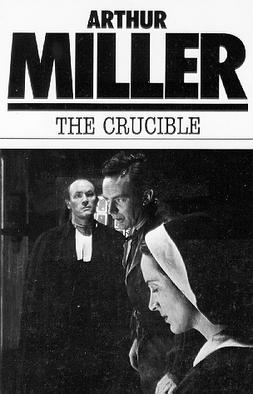I first learned about the Salem Witch trials when I read Robin Cook’s ‘Acceptable Risk‘ way back in 1998. I was immediately intrigued. What would drive intelligent educated people on witch-hunts? What was that hysteria that gripped Europe in the middle ages and the US as late as the 17th century? Arthur Miller’s critically acclaimed play The Crucible dramatizes the Salem Witch Trials and gives a glimpse of what may have happened.
The Plot
The play opens up in the home of Reverend Parris sitting by the bedside of his pale sick daughter Betty Parris. The doctor cannot say what ails her and there are rumors of devilry abound. Parris is nervous for his daughter and his niece, Abigail Williams, whom he has seen and suspects of indulging in pagan rituals. Thomas Putnam and his wife add fuel to the fire by suggesting that the devil has cast a spell on the village and is making all the children sick.
Also, an adulterous affair is hinted between John Proctor and Abigail Williams which casts a shadow on Abigail’s character. This affair is purely a figment of Miller’s imagination and no historical proof exists.
The first act sets the stage for what is to come. It explains to the readers the social, political and economic context that would have triggered off the Salem witch trials. There is poverty, fight for land and church power. The Church is too scared of losing its power and is eager to do away with the slightest threat. The witches of Salem are clearly scapegoats and means to a larger end.
As the play unfolds, we realize that two categories of people are accused. They are those who are completely inconsequential to Salem and are seen as a burden -the village drunkard, the beggar and the foreign slave. Then they are those whose death would profit people by land or kind.
It is implied that Abigail and the girls who claim to have visions of the devil and accuse several people of witchcraft are doing it for sport and vengeance. In the beginning, Abigail and Betty accuse others to remove suspicion from themselves as they were caught performing pagan rituals in the forest. They go on to accuse anyone who doubts their accusations or whose death would benefit their families.
The church is blinded by its duty and refuses to see through the fraud. It quickly and irrationally puts away half the village of Salem behind bars.
Reverend Hales was a key player in the trials. Hales prided himself on being God’s servant and was dedicated to cleansing the society of all creatures of the devil. He was an important figure in the anti-witch movement and later went on to become a key opponent of the witch trials. In Act 2 and 3, we begin to see how he was surprised by the turn of events as the most upstanding figures of society come under witchcraft accusation. In the end, he was so upset by the stubbornness of the court and its refusal to see the fraud in the witchcraft trials that he quit the proceedings.
Verdict
The play is a strong commentary on the power of hysteria and suggestion. It is incredible to see a bunch of juveniles create an atmosphere of fear and suspicion in minds of mature and experienced clergy and how that was manipulated to everyone’s benefit. Miller also compares the situation of the witch hunt to the US governments searches for communists during the Cold war.
The Crucible is thought-provoking and gripping but mostly frightening. It makes one realize that when the collective consciousness sleeps there is not much a few thinking individuals can do to ebb the tide of tragic events.
For book reviews, go here
Save it for later? Pin it!






2 comments
Yes power of hysteria and suggestion are great influencers. If you remember the famed “The Northern Lights” movie from Philip Pullman’s dark materials….it highlights similar point. The church afraid of losing its power supports Metatron the arch angel against the knowledge seekers.
Similar instances are shown in other films dealing with witch-hunts. I forget the names though. 🙂
Hey..you should definitly read that Robin Cook and also try to remember the other books – I would love to read them